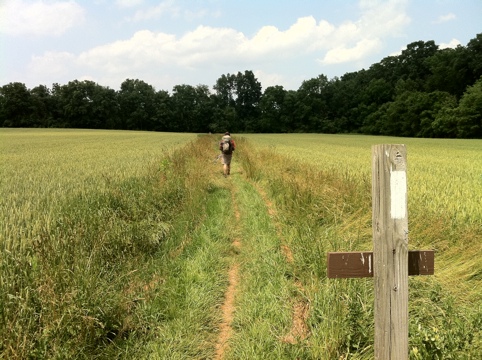Lets play a visualization game, shall we?
Close your eyes and envision outer space just moments after the big bang. What do you see? Chaos, right? Some gasses are spinning off in separate directions while others are pulled together due to their gravitational force. That is until another wave of hot gasses ruptures through and breaks the converging mass thus creating a whole new series of smaller sets of gasses as well as other converging masses. The only constant- is change.
Now, replace “hot gasses” with “smelly hikers” and you have accurately grasped the social construct of the Appalachian Trail. Actually, the proper term would be “smelly hiker with hot gasses” (the AT is pretty much a symphony of farts- yes I found it necessary to inform you of that. Blame yourself for ever reading this site).
Prior to departing for the AT, I had imagined the trail to be a cluster of static groups marching north from Springer Mountain, Georgia. And in the early stages of the trail, this is exactly how it worked. Most hikers either come out with another person/multiple people or quickly attach to those within a near proximity, not unlike the way you would make friends on the first day of school. Groups would form to relieve the anxiety of not having to walk through the cold, bare woods by your lonesome. Early on, it wouldn’t be uncommon to witness groups of up to eight people stroll into a campground at a time.
Slowly, however these groups started to break into smaller divisions. The 45 year old school teacher had less in common with the 19 year old stoners than she may have originally considered. Or – the super competitive, army vet wanted to push out big miles while their soon-to-be former hiking companion was slowed due to a series of small nagging injuries. All of a sudden the grouping by proximity philosophy started to prove impermanent.
Soon group dynamics had more to do with common interests and hiking pace. The recent college grads looking to do 22-mile days seemed to find one another. So too did the retirees. Groups of 6-7 now were in clusters of 2-4.
And then eventually, the concept of “group hiking“ breaks down as we know it. Although it’s not unusual for hikers to arrive to a common destination in groups of 2 or 3, the day of the static group is over (with few exceptions, of course).
It is at this point you might hike with the same person for three days, split apart because they needed to stop into town to pick up a mail-drop, only to run into this person two weeks later and resume hiking as if you’ve never separated.
It is at this point you have likely camped underneath the stars by yourself- multiple times.
It is at this point you have likely gone a full day without seeing another human being.
It is at this point in the hike, the AT cliché “hike your own hike” has really taken precedence.
To the reader at home, I understand that the concept of hiking/camping alone for a few days might seem terrifying. I assure you however, that it is not. After a few months of living in the woods, the woods become your mental concept of home. A tree becomes the norm, while a building, road, or artificially scented human being is what stands out as unique. Now, you feel no more uncomfortable walking through the mountains by yourself, as you would have felt sitting on your couch watching TV by yourself just a few months before. We have turned into feral creatures.
But still – you might be thinking, “maybe hiking alone isn’t that bad, but I would still prefer to hike with someone else.” Maybe you would fall into this small subset of people who remain with the same familiar faces. Odds are, however, that you would eventually feel otherwise.
The alternative to “hiking your own hike” is essentially, “to hike someone else’s hike”. This could require forcing big miles in the face of severe fatigue, deviating into the nearest town when you have more than enough supplies to get to the following, or taking it easy on a day where your energy level is screaming 25+ miles. For a few days, or even a few weeks, this compromise may be worth the social security. Remaining with the same person/people for 5-6 months and working around their schedule arouses a level of annoyance meant to be reserved only for those in the institution of marriage. The AT, in large part, is about finding yourself – which is hard to do if you’re living on someone else’s terms.
Collectively, what the social dynamics have evolved into, is a community of independent spirits. Often we are still pack creatures enjoying each others company, but our long-term loyalties are tied only to ourselves.
Finding peace in times of solidarity, I believe, is one of the true benefits of this journey.



Pingback: A Day in the Life of An Appalachian Trail Thru-Hiker | The Good Badger()
Pingback: The Social Construct on the Appalachian Trail | The Good Badger « Hike for the Homeless()